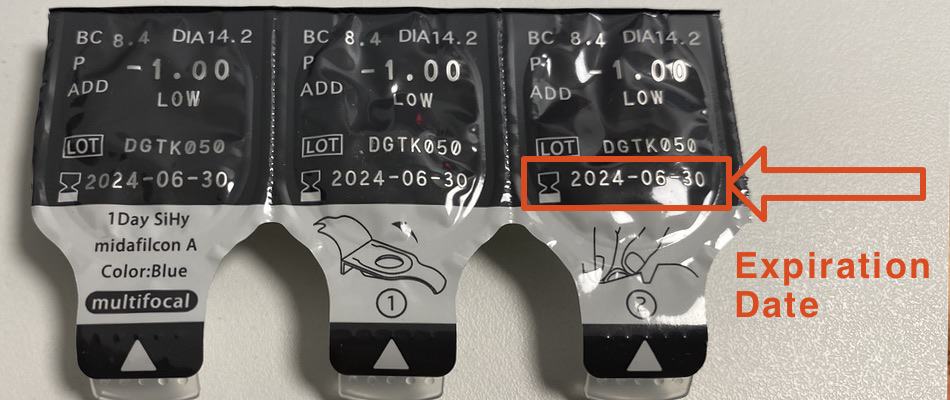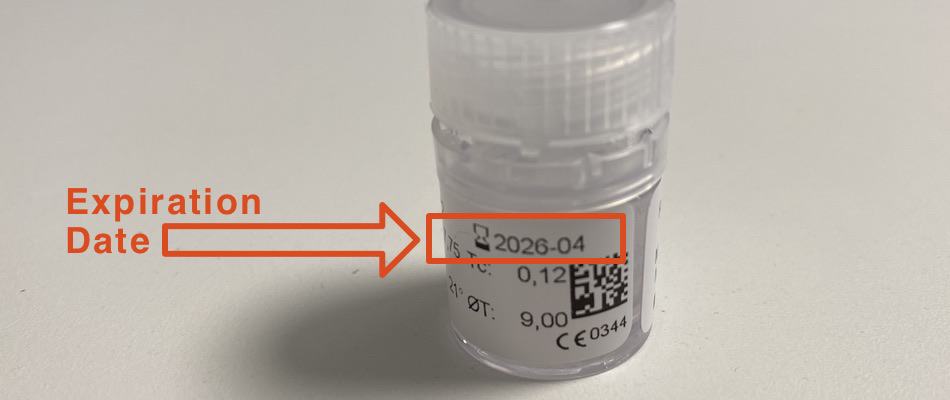In this article, you will know where to find the expiration date for hard and soft contact lenses. A lot of people take not much attention to the expiration date of their contact lenses which might cause a variety of problems like infections, less visual acuity, and dry eye symptoms. This is why you should never extend wearing over the expiration date.
The expiration date for soft contact lenses is found on the blister where the contact lens is stored or on the package where all the blisters are placed. Usually, you can expect the date of expiration 2-4 years from the time you bought the contact lenses.
Hard contact lenses have the expiration date printed on the little container they are stored in when you bought them. Besides this, the information on the container the contact lens also has a laser engraving with the LOT number makes it possible for the optician to ask the manufacturer when the expiration date will be if the original container is lost.

Why Do Contact Lenses Even Expire?
Contact lenses are stored and packaged in a sealed environment which is sterilized. When time passes the manufacturer of the lenses can not be sure that the contact lens will be still sealed because usually packages deteriorate as they age and will be more prone to contamination.
Depending on the lens design and the material used by the manufacturer to produce the lenses certain coatings might be applied to the contact lenses that just might lose their wetting characteristics.
Today modern contact lenses deteriorate faster than their older counterparts. But therefore the older contact lenses provided the wearer with less oxygen transmissibility and worse wetting compared to modern lenses.
Can I Wear Expired Lenses?
Expired contact lenses should never be worn. Despite the fact, manufacturers cannot guarantee that the lenses are safe to wear usually the material deteriorates over time. This means when the contact lens is expired but you just opened it wetting characteristics a torn lens or debris on the contact lens will be seen faster by the optician under the microscope.
I am an optician and usually, people say things like, yeah I know I already should have switched to a new pair but I do not feel anything going wrong so it is probably fine. No this is just not the case. Usually, the optician or optometrist can tell if the lenses are expired because of the characteristics of the lenses just described. But also your eye does not show you any signs over a long time but the optician for example can already see blood vessels on the periphery of your cornea.
All these mentioned points lead to a higher probability of infections serious eye problems and in extreme cases blindness. It is just not worth the cost to not take care of your contact lenses correctly.

What Happens if You Wear Contacts Past Expiration Date Anyway?
The lower oxygen levels reaching your cornea will first lead to an accumulation of blood vessels in the transition area from the transparent conjunctiva to the white conjunctiva. When the eye can not get the oxygen directly from the air through the tear film another pathway is used to cover the oxygen supply. With an ongoing insufficient supply of oxygen, the blood vessels will grow towards the middle of your cornea.
Depending on how low the oxygen levels are and how much time passes with the expired lens the growth of the vessels will continue. Those changes done to the cornea due to the expired or wrong contact lens are irreversible. When the oxygen levels get so low that metabolic issues come up the water gradient in the different parts of the cornea will change. In such a case more water gets stored in the cornea which leads to swelling and the loss of transparency.
With the eye generally not functioning optimally infections will be far more likely. This is usually what opticians most when contact lens wearers use the lenses after their expiration date. It does not happen in all cases but it is definitely more likely.
Some [contact lenses] require a one-year renewal, some a two-year renewal. If your state has not set a minimum expiration date, Federal regulation sets a one-year date unless your eye care professional determines that there’s a medical reason for less than one year.
— FDA
As you can see by the quote of the Food and Drug Administration the expiration date can be even shorter for an individual wearer if a professional determines that. There are a lot of cases where this makes sense in a contact lens practice like when debris accumulates fast on the contact lens surface.
You should also use your contact lenses with responsibility. Looking at the expiration date here and then could prevent you from a lot of trouble which some might be irreversible. So writing the date you need to change your lenses in the calendar or do it with an app that reminds you when it is getting close the expiration date.
As always I hope you found the information you were looking for.
I wish you a great day.
